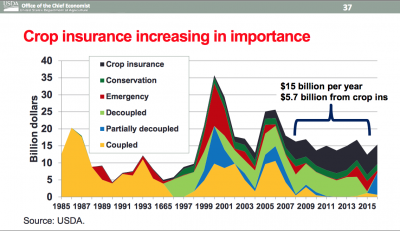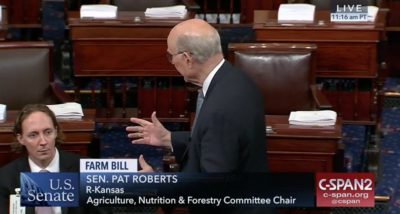Farm Progress' Joshua Baethge reported at the end of last week that "it’s hard to find anyone optimistic about passing a new farm bill this year. While the two political…
Farm Bill Passes the Senate
Washington Post writers Caitlin Dewey and Erica Werner reported on Thursday that, “The Senate passed its version of the $428 billion farm bill Thursday, setting up a bitter fight against the House over food stamps, farm subsidies and conservation funding.
“The Senate measure passed in an 86-to-11 vote, overwhelming support that reflected a bipartisan desire to rush relief to farmers confronting low prices for their products and an array of other troubles. But the bill faces challenges when lawmakers meet later this summer to reconcile gaping differences between the House and Senate bills.
#FarmBill passes the Senate 86-11 pic.twitter.com/WkciN5iQnw
— Farm Policy (@FarmPolicy) June 28, 2018
“The House version of the legislation, passed narrowly last week with no Democratic support, imposes strict new work requirements on able-bodied adults seeking food stamps. The Senate version, which needed Democratic votes to pass, does not include major changes to food stamps.”
Dewey and Werner explained,
Key senators have said they would not support a final bill containing work requirements, even though that policy is backed by the White House, because it would jeopardize the bipartisan support the legislation needs to pass. The Senate farm bill also preserves a major conservation program gutted in the House bill, as well as a separate provision, unpopular in the House, that would limit farm-subsidy payments.
The Post article added, “With House Republicans insisting they will fight for their version of the legislation, the discrepancies have fueled fears Congress will not be able to pass a new farm bill before the law expires Sept. 30. That could cause major disruptions in some programs, unless lawmakers extend the legislation or appropriate separate funds.”
The Post writers also pointed out that, “Farm income has dropped in each of the past four years as commodity prices have fallen. Slightly more than half of all farms now lose money each year, according to the Department of Agriculture — a predicament that is expected to worsen as the Federal Reserve raises loan interest rates and trade tensions threaten export markets.”
Also after the Senate passed the bill, DTN Ag Policy Editor Chris Clayton reported, “Thursday amounted to a handful of votes with hours of delay in between as leaders of the Senate Agriculture Committee sought to avoid votes on measures that the committee did not support.
They staved off a vote, for instance, that would have set a means test for crop insurance premium subsidies.

The DTN article stated that, “The key difference between the Senate and House versions of the farm bill is how they treat work requirements for people receiving food aid under the Supplemental Nutrition Assistance Program (SNAP). The House tightens those work and job-training requirements, which cost the bill Democratic support and led to more difficulties getting the House bill passed over the last month.
“The Senate took up an amendment Thursday similar to the House bill, but voted to table, or effectively stop the provision from being added. The amendment by Sens. John Kennedy, R-La.; Ted Cruz, R-Texas; and Mike Lee, R-Utah, would have eliminated work or job-training waivers used in 35 states and placed work requirements on able-bodied people without dependents, as well as require identification when someone uses a SNAP card at a retail outlet. The amendment failed 30-68 in a bipartisan vote.
The @SenJohnKennedy, @SenTedCruz, @SenMikeLee #SNAP Work Requirements #FarmBill Amendment tabled on a lopsided 68-30 vote; measure would have tightened work requirements for food stamps. pic.twitter.com/QDpfWqtxVN
— Farm Policy (@FarmPolicy) June 28, 2018
“In opposing the amendment, Senate Agriculture Committee Chairman Pat Roberts, R-Kan., said the farm bill already has SNAP reforms, and he pointed to SNAP pilot projects already underway in 10 states with plans to expand those to eight more states.”

Mr. Clayton also noted that, “A group of amendments was added late to the bill by unanimous consent as a way to move to a final vote. Among them is a provision from Sen. John Thune, R-S.D., that would allow farmers with acreage enrolled in the Agricultural Risk Coverage (ARC) program to change their election to the Price Loss Coverage (PLC) program in 2021. This does not mean farmers would have to wait until then, but if a farmer keeps acreage in ARC or moves acreage to ARC after this farm bill goes into effect, then they would get the choice to switch later on, assuming this language makes it into the final version of the farm bill.”
Bloomberg writer Alan Bjerga reported on Thursday that, “The Senate plan boosts funding for pilot programs that study the effectiveness of job training for food-stamp recipients, but doesn’t change work rules nationwide. The House version changes eligibility rules for food stamps.”
The Bloomberg article noted that, “The Senate’s farm bill lowers the adjusted gross income threshold at which farmers are no longer eligible for farm subsidies to $700,000 from $900,000. In addition, it would increase funding for U.S. Department of Agriculture trade-promotion initiatives. Funding for trade programs is of heightened concern to farm groups as Trump threatens to impose new tariffs against major U.S. agricultural buyers such as Canada, Mexico and China.
“The Senate bill also would boost acreage in the Conservation Reserve Program, the biggest USDA land-idling program, to 25 million acres from 24 million. The House bill raises the cap to 29 million. Under the program, farmers agree to halt production on environmentally sensitive land in exchange for an annual payment.”
And the Associated Press reported Thursday that, “After the bill’s passage, House Agriculture Committee Chairman Mike Conaway, R-Texas, congratulated his counterparts in the Senate on a ‘hard-won victory’ and said he looks forward to ‘working together to send a strong new farm bill to the president’s desk.'”
For additional outlook from Chairman Conway, see this FarmPolicyNews update from earlier this week, “After House Passage, Farm Bill Perspective from Chairman Conaway.”





